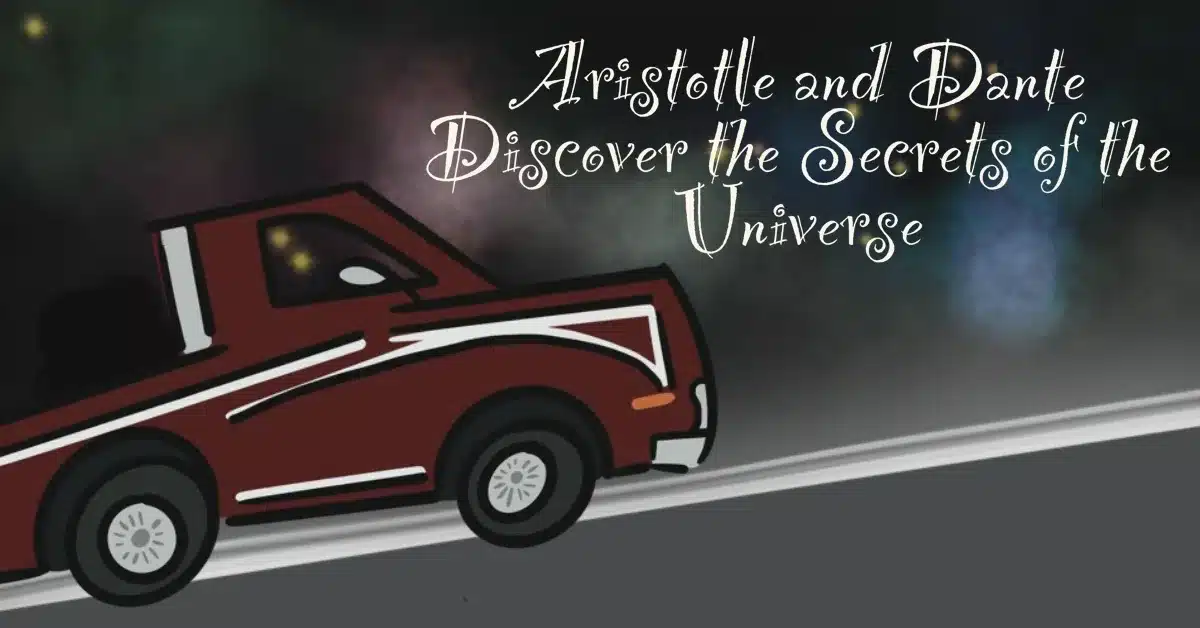The queer narrative in Aristotle and Dante Discover the Secrets of the Universe
I remember the first time I read Aristotle and Dante Discover the Secrets of the Universe a few years ago. I was wandering through the hushed aisles of the public library, looking for the next thing to read between classes. I don’t know what it was that grabbed my attention, maybe the beautiful cover, the delicate lines of the letters; maybe it was how worn the spine was that indicated this book had been read and loved by many. I picked it up, checked it out, and I became eternally grateful for that day I was introduced to the beautiful words of Benjamin Alire Sáenz.
Aristotle and Dante Discover the Secrets of the Universe is more of a poem than a narrative—it’s a love letter for those that are young, queer, and discovering who they are. Set in the late ’80s, a time not quite ready for pride parades, it tells the story of a fifteen-year-old boy named Ari, a quiet, introverted Mexican, troubled by his brother’s absence, now in prison, and his own sense of displacement in the world. Guided by his anger, Ari lives his life stuck, guided by internal turmoil. Until he meets Dante: a smart, adventurous boy who not only teaches him how to swim, but to see life and love in a new way.
The structure and writing of this book are unlike any other, stepping outside of literary norms as a symbolic way of demonstrating what it means to be queer, someone outside the heteronormative. The story is a culmination of characters, their lives, and their growth, more than a standard plot and journey.
“I wondered what that was like, to hold someone’s hand. I bet you could sometimes find all of the mysteries of the universe in someone’s hand,” writes Sáenz.
The book does a beautiful job depicting being young and managing the struggle of learning and accepting a queer identity through the characters of Ari and Dante. It explores different paths taken, both of understanding and exploring, as well as denial and isolation. Since the setting takes place in the late ’80s, it really draws on the theme of internalized homophobia in the queer community, which is still relevant today. Any youth learning about themselves and trying to understand their identity will always experience those underlying thoughts of doubt and shame. The internal conflict between abashment and acceptance that comes with being queer remains relevant today and likely will be for years to come. Demonstrated through Dante’s confidence and Ari’s uncertainty, there will always be those nagging thoughts that make it hard to step outside of the norm. As a reader, you question yourself and wonder if it’s easier to just pretend to be a certain way. It’s a strange mixture of fear and hesitation, pride, and relief. It’s never one forward path, and never without obstacles.
“And me, I always felt that I didn’t belong anywhere. I didn’t even belong in my own body – especially in my own body. I was changing into someone I didn’t know. The change hurt but I didn’t know why it hurt. And nothing about my own emotions made any sense,” writes Sáenz.
Aristotle and Dante Discover the Secrets of the Universe is a story about growing up and choosing between hiding who you are and being brave enough to be yourself in a world that hates you for it. Through Sáenz’s poetic words, the story truly submerges you into the lives of these characters. It focuses so purely on the personality and growth of its characters that readers can feel a personal connection, imagining themselves in the characters’ shoes. Sáenz emphasizes the theme of healing and learning through others. Ironically, it reminds me of the idea by the philosopher Aristotle that humans are inherently social beings who are made to grow with others. Sáenz artistically portrays the relationships of family, friendship, and romance—masterfully showing their newfound connections or the rekindling of old ones.
Humans are made for humans, not solitude, a lesson Ari learns throughout the book. He learns the importance of relationships, support, and love, whether that be of a mother, father, friend, or lover. It’s these strong connections that build someone up, bring out their best selves, and give them the strength to learn to love and accept themselves, even when others don’t. This idea is especially important in a journey of self-acceptance. The need for a support system while understanding your queer identity is one that is, unfortunately, not always realized. The book gives its readers a main takeaway: we must learn from and lean on others until we’re strong enough to face our identity on our own. Ari and Dante have grown to be those pillars for queer youth.

